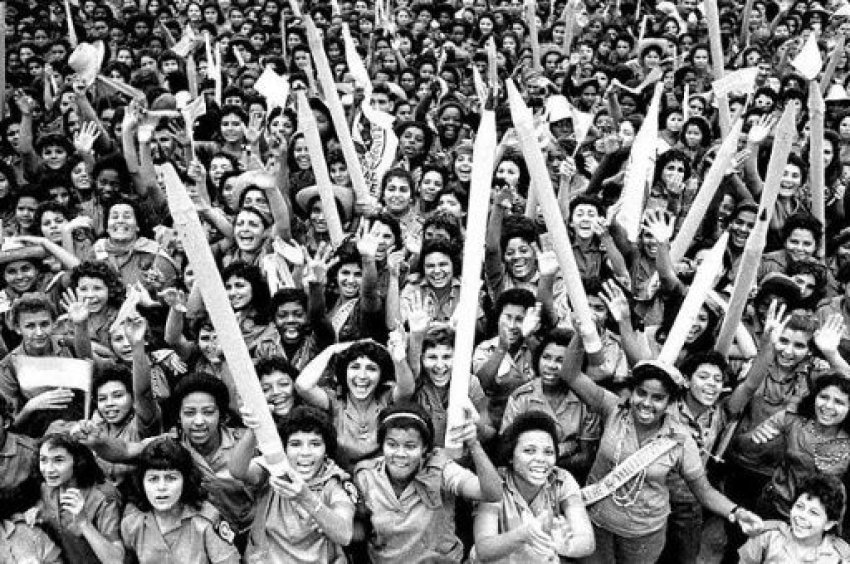
Cuba’s world famous adult literacy campaign was the subject of a fascinating forum following a screening of the 2011 documentary film Maestra on June 22 at the Resistance Centre.
Maestra interviews nine women volunteers who taught during the campaign, including Norma Guillard, one of the first Cuban women to describe herself as a feminist; and Diana Balboa, one of the first to declare she is a lesbian and an international advocate for gay and lesbian rights. Both were 15 years old at the time of the Cuban literacy campaign.
The screening and forum, hosted by Green Left and the Australia Cuba Friendship Society, heard from retired secondary school teacher and former NSW Teachers’ Federation Executive member Bob Treasure; and educator Ruth Ratcliffe, who is finalising her PhD on the changing relationships between communities and schools associated with a First Nations adult literacy campaign in three sites in far western New South Wales. She was in Brewarrina, NSW, when the Cuban literacy program was implemented there.
Lia Weitzel, Research and Campaign Officer at Literacy for Life Foundation (LFLF) who researched the Cuban “Yes, I Can” adult literacy campaign in Aboriginal Australia, said it was an alternative to commodified education. She also spoke about LFLF’s experience working with communities and community-controlled organisations and service providers to raise levels of adult literacy.
Cuba’s Yo, Sí Puedo (Yes, I Can) adult literacy campaign was set up after Cuban dictator Fulgencio Batista was ousted from power in December 1958.
Treasure described how, the next day, a new era began. On September 26, 1960, President Fidel Castro told the United Nations General Assembly that Cuba would eradicate illiteracy, nationally, within a year and called for volunteer teachers.
The campaign kicked off in earnest in April 1961 and ended in December that year. It was an eight-month effort to abolish illiteracy in the Caribbean nation. In rural areas, about 40% of Cubans were illiterate.
A-quarter-of-a-million people, half of whom were under 18 years old, volunteered to teach. Many were young women, who left their homes and families to spend up to eight months in villages in remote mountain ranges and valleys.
The teachers lived with their students, teaching at night and on weekends. By the end of the campaign, about 707,212 adults had learned to read and write and the national literacy rate reached 96%. Many students learned to write the alphabet — or their names — for the very first time.
The Cuban National Literacy Campaign did not end in 1961, however. Literacy centres continued and Cuba also became a pioneer in adult literacy education.
Cuba’s adult literacy campaign model has been exported to more than 30 countries, most notably in the Global South, and Australia. In all, more than 10 million people have learned to read and write in their own language as a result of the Cuban program.
Ratcliffe and Weitzel described how the program was organised in various parts of Australia.
Between 40–70% of Indigenous Australians struggle with reading and writing. Decades of segregated, racist and inappropriate schooling, on top of other traumas resulting from colonisation, have contributed to very low rates of adult literacy among First Nations people.
Low literacy is connected to lower employment and education options, poor physical and mental health, insecure housing and many other problems, including alcohol abuse and crime.
Disturbingly, up until the 1950s, Aboriginal students across New South Wales were regularly excluded from schools when white parents objected. Until 1970, Aboriginal students in NSW were denied access to schools for being either “too black” or “too white”.
It wasn’t until 1972 that the “exclusion on demand” clause was finally removed from the teachers' handbook.
The Cuban literacy program was brought to country by Australians who had worked on the campaign in Timor Leste.
Wilcannia, in central NSW, was chosen to trail the adult literacy program in early 2012. The University of New England provided assistance and the Wilcannia Local Aboriginal Council ran the program.
The program’s success can be attributed to three elements. First, the Cuban literacy model is pedagogically sound and uniquely adaptable. Secondly, it is based on a model of community involvement. Thirdly, the local First Nations community was given ownership of the program — and they delivered the program after being trained.
Phase 1 mobilised community leaders to promote and help deliver the project. Four local leaders were trained to run the literacy class. Twelve other community members were trained to undertake a household literacy survey and assist with the launch, graduation and other vital community engagement work.
One-hour classes were held daily for 12 weeks. There were two intakes, with 10 students graduating from the first intake and six from the second. The initial pass rate was 50%, which is high for this type of project. Eventually Yes, I Can was rolled out across eight regional NSW communities, including in Wilcannia, Walgett, Bourke and Brewarrina.
A Literacy for Life program, based on the Cuban model, was rolled out in Campbelltown, on the outskirts of Sydney, in 2019.
A campaign to help adults improve English language reading and writing was launched in Yarrabah, Queensland, in May. LFLF is coordinating the program in Yarrabah, funded by the Queensland government.
LFLF has run adult literacy campaigns since 2012 in nine Aboriginal communities in NSW and one in the Northern Territory at Ltyentye Apurte (Santa Teresa) from 2019.
Currently, the program is also being taught in Bourke, NSW, and in the NT.
[Maestra was produced and directed by Catherine Murphy, who studied in Havana during the 1990s during the so-called Special Period. It is distributed by Women Make Movies, a non-profit organisation that aims to address the under-representation and misrepresentation of women in the media. The film has won several awards, including the Director’s Choice Award at the Black Maria Film Festival, and received an honourable mention at the Ojai Film Festival.]